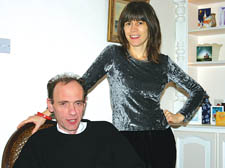|
|
 |
| |

Colin Ludlow with his wife Anna – she too suffered from bowel cancer |
A scary story, but will the NHS listen to it?
Daniel Allen says that the Health Service could learn more from Colin Ludlow’s lightly told but nightmarish hospital
memoir than it has from a whole legion of policy wonks Order this book
THERE must have been occasions during Colin Ludlow’s hospital odyssey through bowel cancer and countless operations when he wanted to turn to the wall and say: “Enough. I want to die.”
The NHS appears, at times, to have done its best to oblige, and the fact that he is alive to tell his tale is testament as much to his understated courage as it is to the doctors and nurses whose skills just about prevailed in the face of huge systemic failings.
His account of a nightmarish five months spent in the Royal Free Hospital is a compelling meditation that mixes Shakespeare and surgery, Marx and mashed potato (“lumpy” – hospital food is still dire).
Above all, it exposes the patient in contemporary health care as little more than a pinball, banging about between the outposts of a system that is meant to function seamlessly. Patient-centred care? Not quite.
Ludlow, a television producer, is an excellent guide through this wasteland. Incredibly, he avoids mawkish self-pity, to which he has a greater claim than most, and tells his tale of unfolding woe with a surprisingly light touch.
As illness and, inevitably, MRSA grip, he descends into a version of hell where he seems destined to spend eternity waiting for operations that get cancelled and where the devil comes dressed as a dietician with cruelly inept advice.
His professional background enables Ludlow to compare and contrast the health service of popular, TV-fuelled perception with blunt reality.
As he drifts in and out of pain and post-operative consciousness and, more than once, pushes at heaven’s door, Ludlow’s drama is like Holby City on hallucinogenics; a weird, warped world where individuality is stripped away and the anticipated “bastion of order” becomes a vision of chaos. “I remain haunted by my time in hospital,” he writes. One can see why. Four years on, he is still recovering.
The suspicion that Ludlow may once have upset some vengeful deity is compounded not just by his mother’s death but by the fact that his wife, Anna, also endured bowel cancer.
Her journey back to relative health sounds straightforward in comparison, which says everything about the gravity of his illness and nothing about the insignificance of hers.
Bowel cancer is not something you shake off: with her form of the disease, only 43 per cent of patients live for five years or longer after surgery.
The fact that they are both still alive causes Ludlow to wonder whether, given all he has experienced, he is lucky or unlucky.
“My cancer hell” has become a popular literary genre and it is reasonable to ask what extra Ludlow brings to the table. Perhaps not much if you are entering your own period of anguish and are looking for clues about how to emerge intact.
There is, on the surface, little of comfort here. By the skin of his teeth, however, Ludlow gets through; that he does so in the face of everything that illness and a lumbering, malfunctioning Leviathan of a system can chuck at him is, in the end, a cause for raucous celebration of human fortitude.
In the face of such spirit it seems churlish to criticise, but one small irritation is Ludlow’s description of past events in the present tense. This will not jar with everyone, but when it does it may detract from what is otherwise a powerful account.
It is customary to say of stories such as Ludlow’s that they should be “required reading” at the Department of Health. It is also customary for the Department of Health to ignore such suggestions and live instead on a diet of fat policy drafts that promise much but, if Ludlow is right, deliver little.
And there’s the tragedy: the NHS has more to learn from a single patient’s personal account of what can go wrong than it has from a whole legion of policy wonks.
Down on the frontline, where the battle between demand and resources rages at its most cacophonous, it seems the last voice to be heard is still that of the patient.

|
 |
|
 |
 |
|
 |
|



